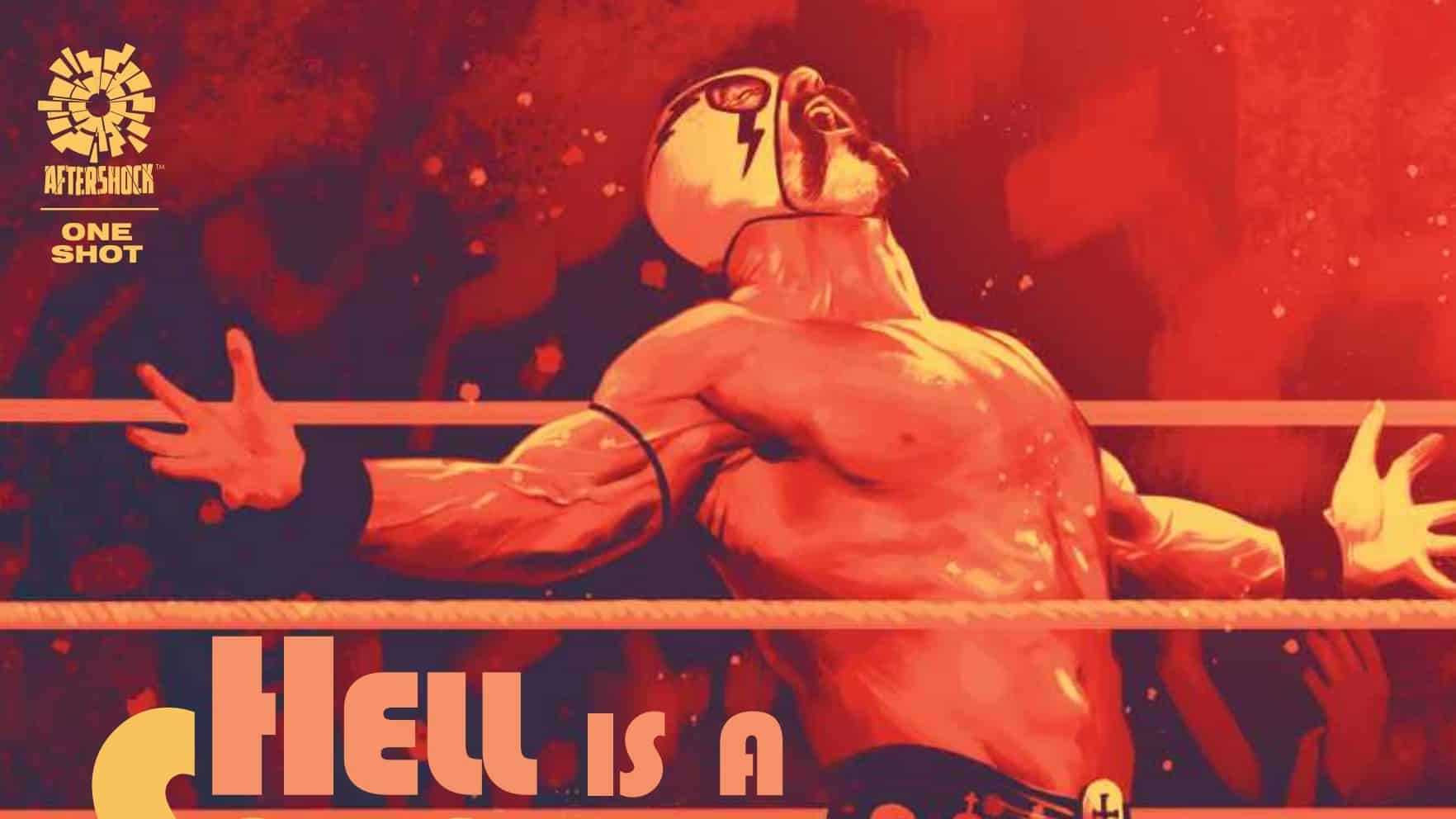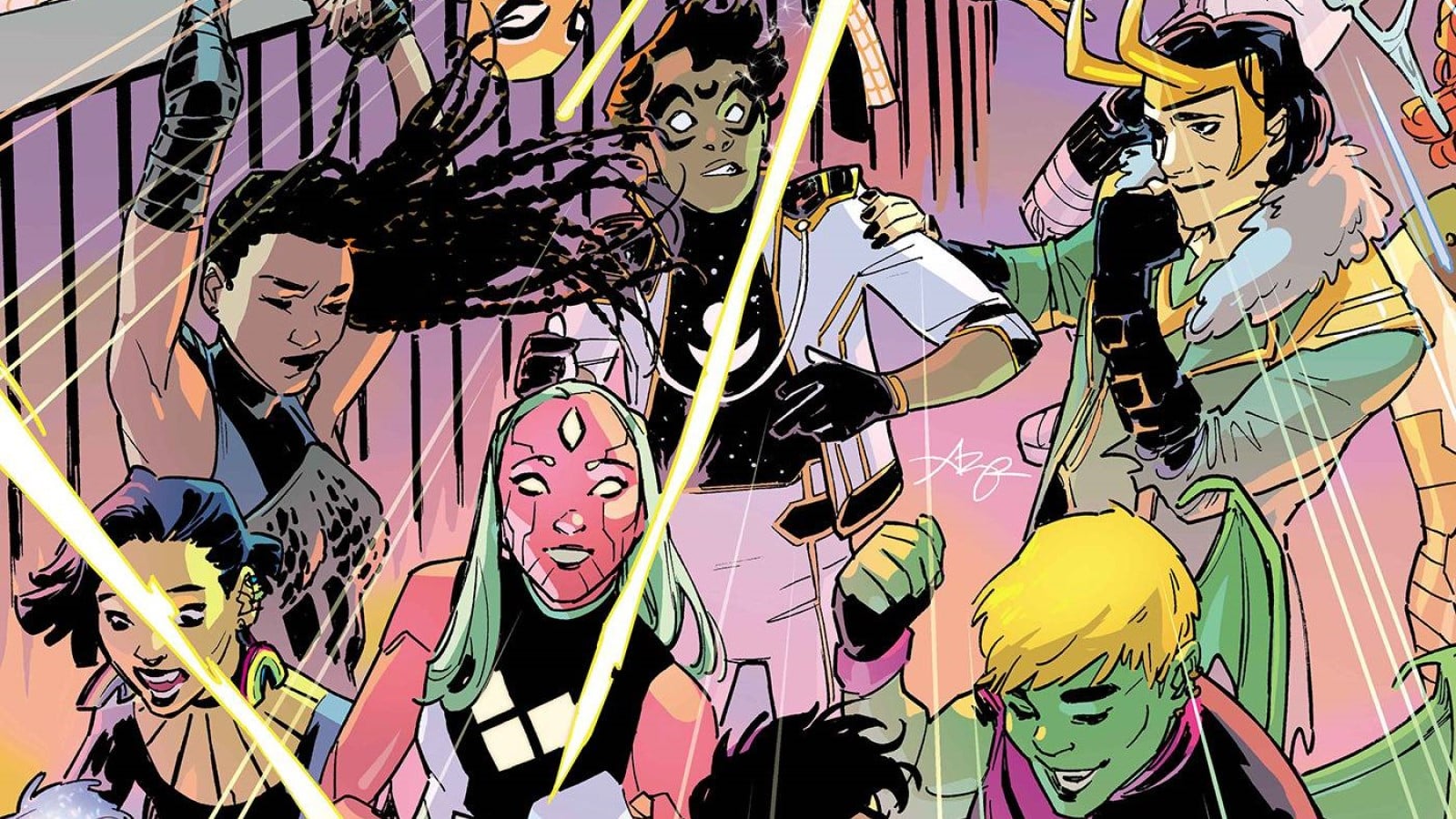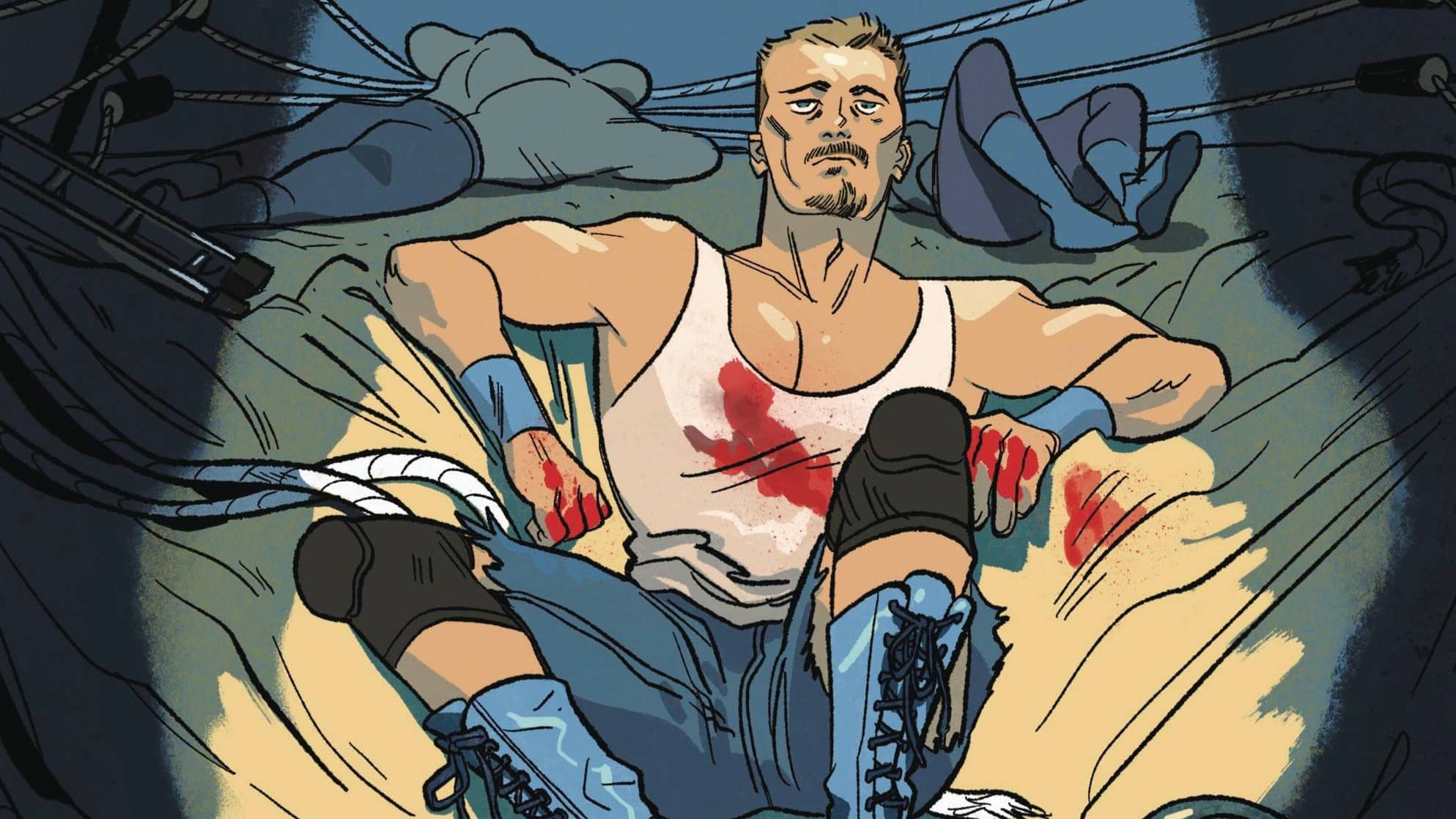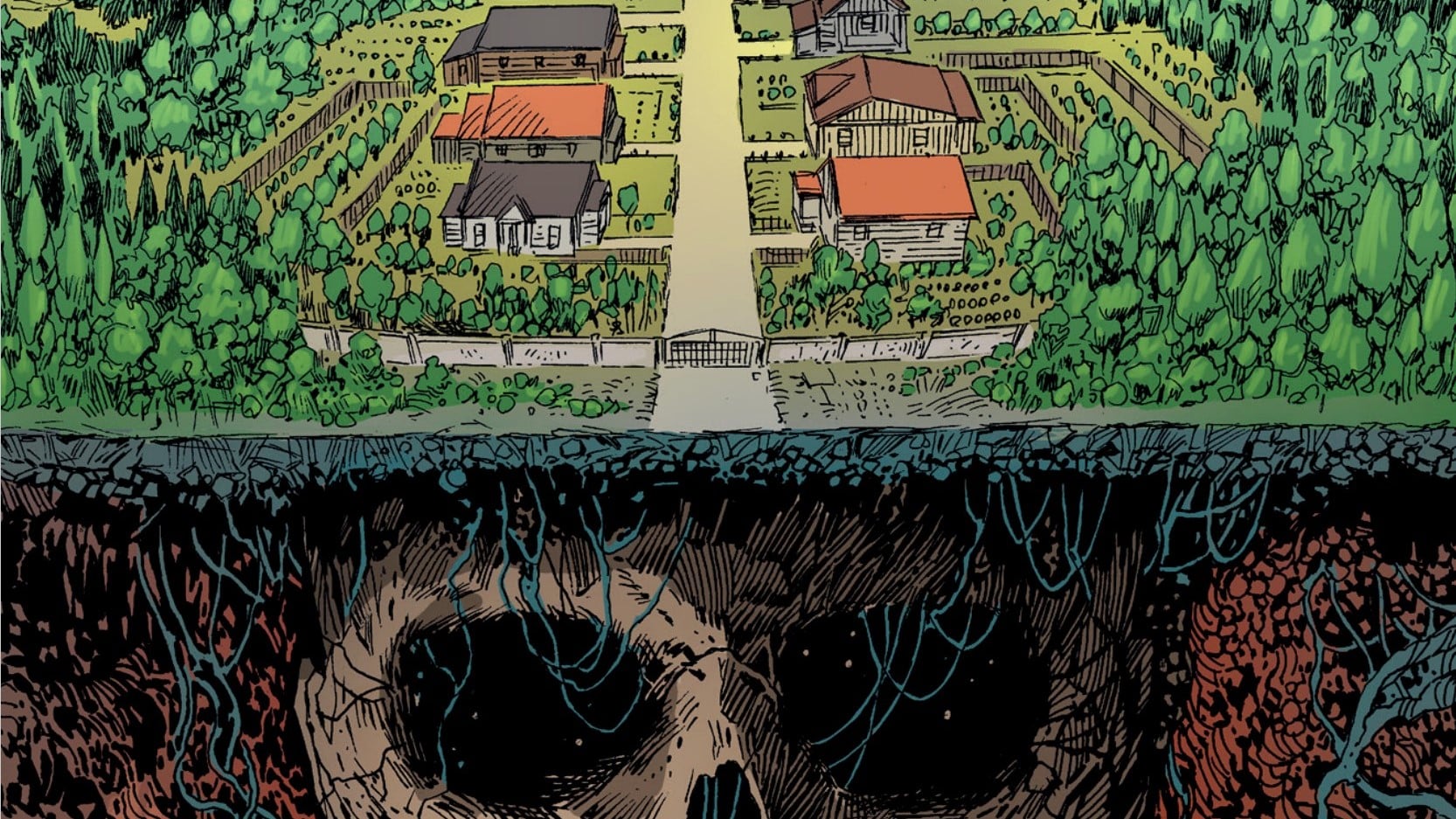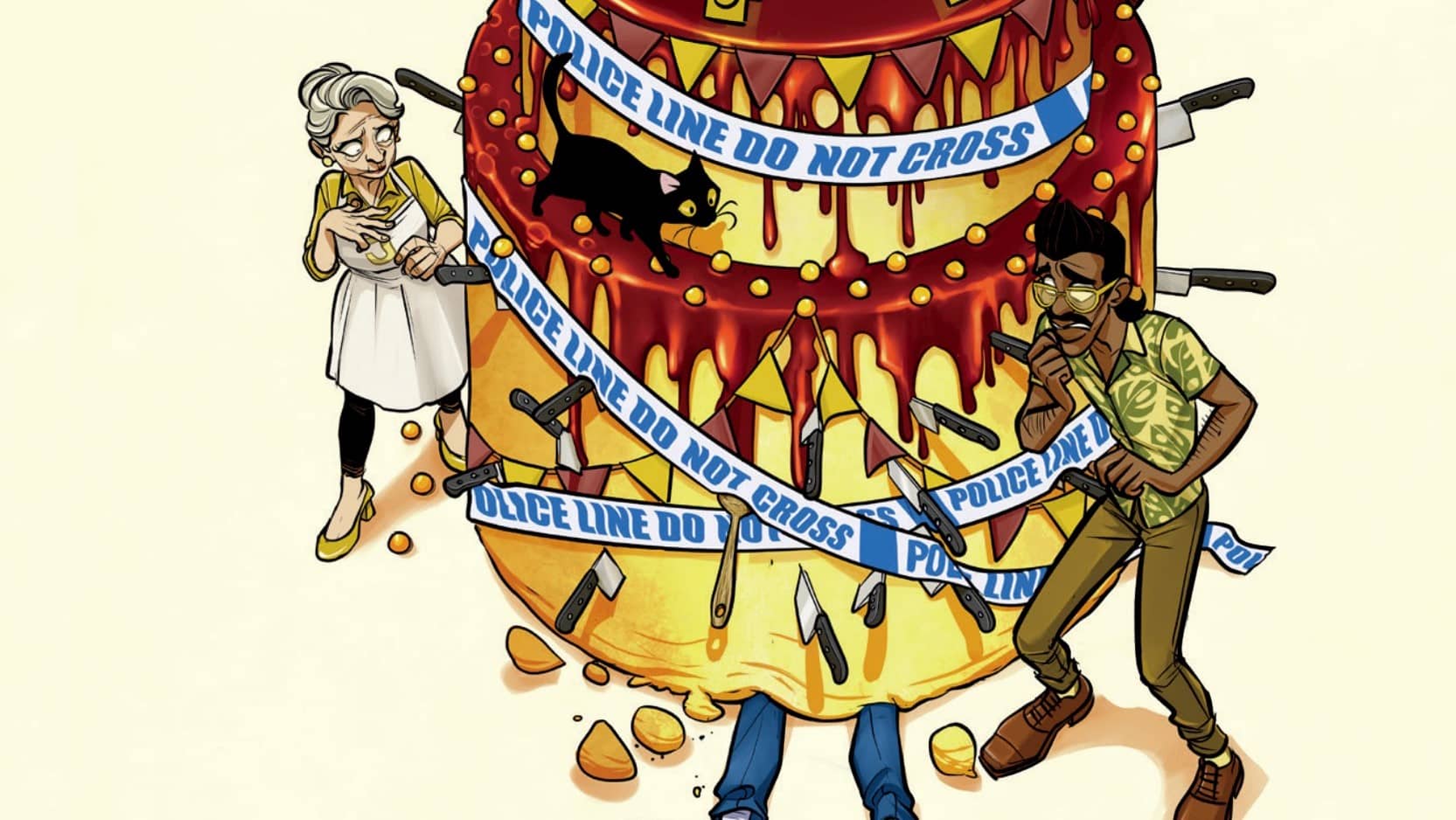By Ian Gregory and Will Nevin
No one can hear you scream about labor rights in space. Fear of a Red Planet #1 is written by Mark Sable, drawn and colored by Andrea Olimpieri, lettered by Dave Sharpe and published by AfterShock.
Ted Walsh wants one more run on top. And he’ll get it by any means necessary in Hell Is a Squared Circle, written by Chris Condon, drawn by Francesco Biagini, colored by Mark Englert, lettered by Dave Sharpe and published by AfterShock.
Oh, bother. There are aliens in the tube! Last Line #1 is written by Richard Dinnick, drawn by Jose Holder, colored by Kelly Fitzpatrick, lettered by Dave Sharpe and published by AfterShock.
Will Nevin: I’m not sure why AfterShock feels so right for this column. The big, high-concept swings? Wild variations in talent and ability to execute? Prodigious, unrelenting output, like the Waffle House in a bar district? Whatever it is, I’m not sure. Point is, Ian, we’re doing three more AfterShock books this week. But, hey, at least one’s a prestige one-shot — that’s something new for us.
Ian Gregory: I despise nothing more than cowardice, Will. Generally speaking, I like a book that makes big swings and misses over one that is technically sound but plays it safe. I want books that are Three True Outcome players. AfterShock, as you say, has series of variable quality, but they almost always take that swing. Let’s see if these books are walks, strikeouts or home runs (or not, if this metaphor is getting labored).
Will: A sports reference! I love it. (Also, welcome back to the Yankees, Aaron Judge — the master of Two True Outcomes.)
Fear of a Red Planet #1: Aw, Hell, It’s Space Capitalism

Will: I gave Mark Sable’s Miskatonic a try because I like alt history almost as much as I like dystopian fiction. Mixing J. Edgar Hoover’s FBI with Lovercraftian lore? Why the fuck not? That was a mistake on my part for two reasons: 1) I didn’t have the background in H.P.’s racist shit to get most of what was going on, and 2) I didn’t think Sable’s work was particularly strong in a panel-to-panel sense. As in most of the series was frustratingly incomprehensible with what seemed like random jumps in the storytelling.
I think this is better on that front, but I still wouldn’t call it great in its ability to settle down and tell a readable story. It helps that this is less ambitious in terms of its core concept … but then again, most of those concepts have already been done with bits of Aliens and Total Recall. Ian, what was your take on Space Capitalism Gone Awry?
Ian: It definitely feels timely, Will, what with that Elon Musk fellow in the news so often.
Will: Why’d you go and bring that dipshit up? I was having such a good day.
Ian: You’re right that this isn’t particularly original on its face — space corpo-hell debt slavery has been a feature in everything from Red Mars to Hardspace Shipbreaker. What I do like about this issue is that it does a lot of good work in setting up a clean murder mystery. We get the setting, we get the potential suspects and we get what is likely the method (the bio-locked gun, or perhaps the autoturrets). All of this is fairly straightforward, but Sable drops enough hints in the setting (for example, what happened on the International Space Station?) that I’m interested in seeing more.
Will: One frustrating thing — and we’ve seen this before with AfterShock — is that the bonus/data/exposition pages almost felt essential to knowing what was going on here. And they were just straight up expository character sketches in the guise of an Evil Space Corp. memo. Not a great way to get me invested in the story when the interesting stuff is a dump at the end of 20 pages.
Ian: I actually didn’t mind the placement of this data page. It reads like a cast page, reminding us of the names and occupations of all the characters (and therefore, suspects) we’ve met so far. I like that we’ve already drawn our own conclusions about these characters, and we only get the corporate perspective afterward.
Will: I thought the art here was fine — no complaints (although I probably want more looks at the Martian landscape, but, ya know, that’s again hitting the writing).
Ian: The art here is very jumbled, in a good way. I especially liked the full-page splash of whatever it is that happened on the ISS, which faithfully renders the confusion of a bunch of corpses in zero gravity. Andrea Olimpieri is also on colors, and he does a fantastic job of working in shades other than red, red and more red. Visually, I think this book is plenty distinctive.
Hell Is a Squared Circle: Wrestling Will Kill You and Everything You Love

Will: Aye, it be’s Will’s Freshest Chicken of the Week, and I’ll start with the art on this one: If you’re going to do wrestling — and if you’re going to do wrestling right — then by god, you need some funky, electric colors. I thought this book did a great job with that.
Ian: Absolutely. The costuming is a big part of this story, in and out of the ring. The action is solid, and I love how strongly Biagini exaggerates the expressions. When a character feels something strongly, they become a caricature of themself, and scenically unrelated imagery gets worked into the page. Just like wrestling occupies a heightened dramatic and emotional state, this book does a great job elevating every sensation to that level.
Will: I enjoyed the story here, too. A wrestling murder morality tale with an untrustworthy narrator? Fuck yeah, gimme that shit. I can’t decide, though, whether this book is too short or just right. The time jump felt abrupt, but it acquitted itself fine. The ending (which I thought landed quite nicely) was maybe a bit sudden, yet that’s where we were going all along, wasn’t it? I think if we stretched this out another 10 or 15 pages, we’re only watering down a nice, tight story.
Ian: The first flashback felt very natural, and it was easily understood. The jump to the future (and to his daughter going from being a kid to a teenager) was much less smooth. I’m not sure what could be done to signpost that better, other than to start the story at the point where the flashback ends (Say, have Teddy begin the story deciding to wrestle again, show the flashback and then jump back forward to that same first scene of him joining the Edmonton promotion).
I think you’re right about the ending, and it employs one of my favorite storytelling devices, what my friends and I like to call the “kung fu ending.” In a kung fu movie, by which I mean the Hong Kong action films of the ’70s and on, the movie comes to an end very quickly after the final fight. The protagonist will get their last punch in, wring their hand, kiss the love interest and bam! Credits. From the last hit of the fight to the credits can run anywhere from one minute to three seconds, but very rarely longer. Compare this to the tortuous action movies of today, especially those accursed Marvel movies, which like to add an extra 10 to 15 minutes of non-punch-related material to pad out the runtime. Have the guts to end the story where it ends, and don’t feel obligated to explain literally everything to the reader.
Will: The one problem with the writing is that it’s not clearly stated how the matches are booked and how strange it would be to change the finish of a match while it’s in progress. The first match we’re not sure what the actual finish is supposed to be, how it was changed and who decided to change it — all of that could have been more clearly laid out. Of course, if you’re not hip to the wrestling business, all of this might go over your head like an elbow drop.
Ian: It’s narratively convenient, in an almost incalculable number of ways, to have the outcome of a wrestling match be in question. When you’re watching wrestling at home, that’s the case, even if you know the result has already been decided. When you’re telling a story about those wrestlers, however, they don’t share that same dramatic tension with the reader. I think it’s a challenge to write a series that acknowledges that the wrestlers aren’t worried so much about winning or losing, but there’s a lot of drama to be found in the methodology, in ad lib, and so on. I’d like to read a wrestling series that reads more like a story about an artist than a story about an athlete (for my manga friends, the difference between Bakuman and Slam Dunk).
Will: Joe Keatinge’s Ringside from a few years ago was more of what we had here rather than what you’re looking for, but that was a solid series — albeit another one of those Image books that got a fast three count and left some storytelling work unfinished.
Last Line #1: We Got Dog Assassins and They’re Not Even Fun

Will: Ultimately, I thought this book was Fine. It doesn’t do anything “wrong” or too weird, but the tone seems decidedly YA, and that makes it not for me. Young London Underground conductor and her brother stumble onto some alien conspiracy and the British version of the Men in Black? Cute, sure, but not the sort of story that sticks to your ribs.
Ian: I was reminded of some of the books we read last week, Will, where we thought the twists made the book worse. This one definitely makes some big swings, but it’s three up and three down, by my reckoning. The opening is Dark, for sure, and then proceeds nicely into some standard spy and conspiracy action. When the dog assassins show up, though, things take an unfortunate turn into goofy and it’s like the first 10 pages have been totally forgotten. Let me be clear: I am down with the hollow Earth. I love the hollow Earth. But I think this twist could have been better presented, or at least a little more restrained. From the moment the dogs showed up, things were going far too fast to be digestible.
Will: Like Fear of a Red Planet, I didn’t think the story was the smoothest (Why, for example, does this conductor get to go along on the investigation? Who knows?!), but it doesn’t have anything too jarring. Or does it, Ian?
Ian: I mainly think the pacing was wildly out of whack. My impression was that Dinnick wanted to get to that last-page cliffhanger, but also wanted to introduce all the characters and the setting. As a result, we get stuff like a robot appearing out of nowhere then conveniently disappearing, and we get captions describing what would have normally been at least a page-long sequence (“We went to the train station and then also we split up”). There was simply no breathing room to sit with the characters, or the premise, and let the reader adjust.
Will: Finally, I thought the art could have done more here, especially in the action scenes and in the designs for our people-sized dog guards. If you’re going to have a man-sized pupper, you better have some fun with it, damnit.
Ian: I agree! You’re putting dogs in suits, and in the end they just look like slightly fuzzier gangsters? Just like with the mood, the visual identity of this book was all over the place. Is it serious? Is it funny? Who knows! Things happen for no reason, and we’re along for the ride.
Does This Smell OK?
- Sound Effects Watch: I liked the way that, in Hell Is a Squared Circle, Mooska dreams of people cheering his name, only for it to transition to “Boo-ska” when he actually remembers what it was like being a heel.
- Rapid fire questions:
- Favorite piece of Mars-related media?
- Will: Close call between Doom II and Total Recall. Maybe the latter?
- Ian: Probably Red Mars by Kim Stanley Robinson, but I haven’t read it in, like, 10 years, so who knows?
- Your professional wrestling gimmick?
- Will: The Professor. I come to your town and insult your intelligence while wearing a jacket with elbow patches, and you pay to see me get beaten up. Fair deal?
- Ian: The Synthesizer. My finisher is that I break a Korg over your back, but the gimmick was discontinued after one match for being prohibitively expensive.
- Will: You’re not getting anywhere on the indie circuit with that one.
- Should grown ass adults read YA lit?
- Will: No. Stop it.
- Ian: As someone who spends a significant amount of time reading Weekly Shonen Jump, aka YA manga, I feel like I’m in no position to judge.
- Casserole of the Week: Three Bean Casserole. This is bordering dangerously close to chili, but chili feels like a lot of work, and this is not that. Lots of room for creativity, though — instead of the recipe’s pork and beans, you can go with your favorite variety of baked beans. Or, fuck, go with Beanee Weenee. You know, class the shit up.
- Speaking of chili, the No. 1 thing to do with leftovers there has to be chili mac, right?
- How dare you mix leftover mashed potatoes with cabbage. Have you no decency, sir?!
- Favorite piece of Mars-related media?

